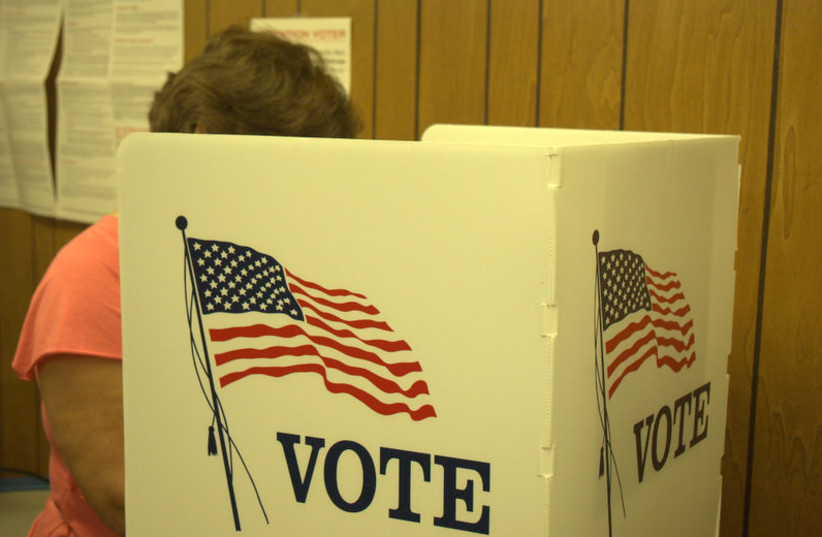Israelis can't take good news.
The prime example of this is the rain. We are, rightfully, obsessed with rain and with water. But no matter how much it rains, it's never enough, or in the right spots, or the correct type of rain, or -- if rain is abundant, as is the case this year -- it must be a precursor of disastrous climate change, and we should all get ready for a dreadfully hot summer.
We're so inundated with bad news -- especially lately -- that when there is good news, we tend to think someone is pulling the wool over our eyes. Especially if the person reporting the good news is Prime Minister Benjamin Netanyahu.
American support of Israel's war effort
On Tuesday, after US President Joe Biden said that Israel was losing international support, Netanyahu fired back with a short video quoting a Harvard CAPS/Harris poll showing that 82% of the American public supported Israel in its war against Hamas.
Indeed, that is what the poll -- taken on February 21-22 among 2,022 registered voters -- found.

But what was the headline in Yediot Ahronot on Wednesday morning?
"82% of Americans support Israel? Not so sure."
According to the report, the poll was misleading because it framed the questions as Israel vs. Hamas, not Israel vs. the Palestinians.
But that was what Biden was referring to: the war in Gaza against Hamas.
And in this war, the poll found that 82% of Americans support Israel more than Hamas, and 68% believe Israel is trying to avoid civilian casualties. Likewise, 63% of those polled said they support Israel continuing its ground invasion to root out the terrorist organization.
The common American citizen
Those findings are not insignificant, nor should they be dismissed as Netanyahu is trying to pull the wool over the eyes of the country. Nor, by the way, are they an indication of support for Netanyahu, but rather for Israel's battle against Hamas.
The numbers are significant because of the efforts among the far-left in the US -- many of whose voices are disproportionately amplified in the media -- accusing Israel of genocide and calling for a cease-fire now.
The protests, the shouts, the "Genocide Joe" slogans, the "How many kids did you kill today" screams, the "From the river to the sea" chants, the various celebrity against genocide campaigns are not swaying the American people -- at least not according to this poll.

Judging by this poll, the American public -- despite all the raucous noise -- has not lost the thread: Hamas began this war with a heinous, brutal attack on October 7, and Israel is justified in seeking to destroy the terrorist organization's capabilities. This goes against the grain of the perception being created that -- with this war -- Israel is hemorrhaging support.
When Alaska Senator Dan Sullivan is hounded through the halls of Harvard by a lone protester with a keffiyeh asking him why he is not calling for an immediate cease-fire and why he is supporting genocide, the impression created is that the senator is the outlier and his position in support of Israel is under siege. But that's an inversion of the truth: the protester is the outlier, and the senator represents the mainstream.
Impact on US elections
That is important to keep in mind when reading reports, some of them breathless, about the success Arab Americans had in Michigan in the Tuesday Democratic primary in getting 13% of the voters to cast a ballot with the word "uncommitted" on it as a signal of protest to Biden over his pro-Israel policies.
For Biden, this is highly significant. He flipped Michigan and won the state in 2020 by some 10,000 votes. All of those votes will be key if he is to win again.
However, even if the Arab votes do not materialize as they did four years ago, they may be balanced out by anti-Trump Republicans as unwilling to vote for Donald Trump as Arab-Americans may be reluctant to vote for Biden. Who knows, perhaps those two dissatisfied camps of voters -- which might both stay home -- cancel each other out.
Nevertheless, as a Politico report put it on Wednesday, the results did not calm Democratic jitters, even though they "fell short of sparking a political earthquake."
But Arabs in Michigan, which -- with 310,000 people of Arab or North African ancestry -- is the state with the most significant Arab voting bloc in the US, is not the only source of jitters for Biden. He also needs to be concerned that if he bends over backward too much in altering his policy on Israel because of the Arab vote in Michigan, he could alienate some Jewish voters in other battleground states that he carried the last time and will need to win this time as well, such as Pennsylvania, Arizona, and Nevada.
These electoral concerns undoubtedly impact Biden's messaging on the war and some of his policies.
The Arab voters of Michigan
The Michigan primary indeed played a role in the State Department's hint last week at a reversal of a Trump administration-era policy that denied that settlements were illegal. It also likely prompted Biden to say that he was hopeful a hostage release deal and cease-fire would be agreed upon by Monday, something that both Israel and Hamas officials said they knew little about. And it probably has something to do with a White House announcement on Tuesday of an additional $53 million in humanitarian aid to the Palestinians.

The Arab vote in Michigan also undoubtedly had something to do with Biden saying this about the war on a late-night comedy show with Seth Myers: "Israel has had the overwhelming support of the vast majority of nations. If it keeps this up with this incredibly conservative government that it has, they're going to lose support from around the world. And that is not in Israel's interest."
That comment was pounced upon by those looking for all signs -- and those signs do exist -- of Biden exasperated with Netanyahu and about ready to cut Israel loose. But it would be wise not to read too much into this statement because Biden said something similar in a private meeting in December that leaked out.
Netanyahu's response to Biden
"Right now, it [Israel] has more [support] than [just from] the United States. It has the European Union, it has Europe, it has most of the world supporting it. But they're starting to lose that support by the indiscriminate bombing that takes place," Prime Minister Netanyahu said two and a half months ago.
The exciting change is not in what Biden said -- he said on Monday night pretty much what he said on December 13 -- the change has to do with Netanyahu's response.
In December, Netanyahu did not directly respond. On Tuesday, he did, with his office putting out a transcript of a short video clip he uploaded under the headline: "Prime Minister Benjamin Netanyahu responds to US President Biden." In that video, he said, without mentioning Biden by name, that "I have been dealing with a political campaign whose purpose is to curb the pressure intended to end the war before its time."

Why did he respond now but not in December? Like Biden, Netanyahu is a politician with an election on his mind, though, unlike Biden, he does not know precisely when it will take place. For Netanyahu, standing up to pressure from the US -- real or imaginary -- is good domestic politics.
Here's a twist: Arab voters in Michigan want Biden to pressure Netanyahu. Netanyahu feels he can parlay that pressure into support, giving him a campaign issue that plays well with his base: Only Netanyahu can withstand American pressure.
Within his 64-word response to Biden, the prime minister cited the Harvard CAPS/Harris poll. But that poll is good news and should be seen as such, regardless of who cites it and for whatever purpose. Let's accept some good news when we hear it.
